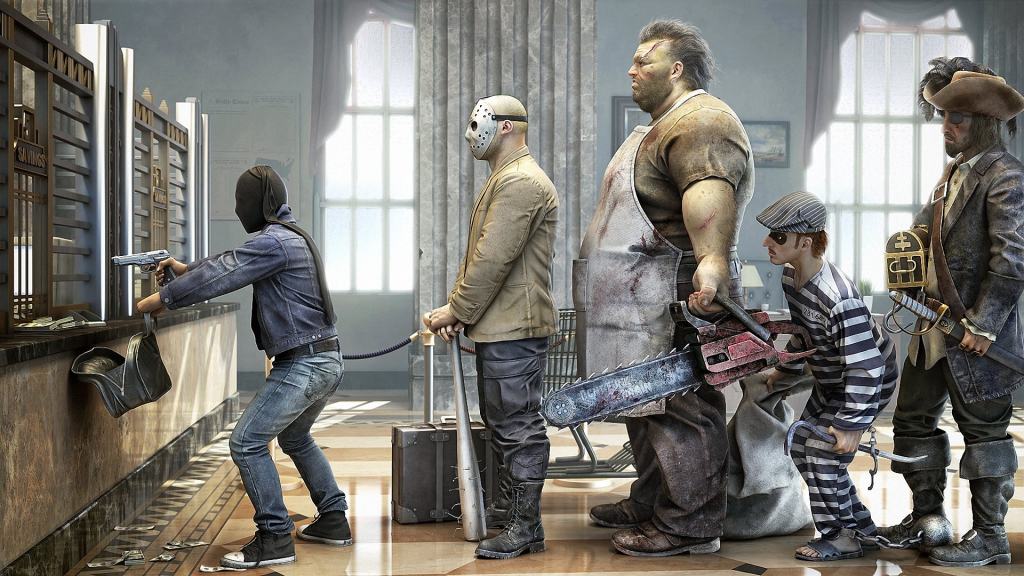15 Strange State Laws That Still Exist Today
Funny, History, Lists, Shocking, WeirdOur nation has always been governed by a strict set of laws; some have evolved over time, some have been completely removed, and some… well, some have been simply forgotten. Most states still have at least one law that makes even the most stoic of judges do a double take; the following list of silly state rules includes 15 of the most unbelievable laws that are still in effect today. Although most of them involve clear cut common sense, make sure you remain mindful of them; should you find yourself in one of the states mentioned below, this may be the only chance to have to avoid the long arm of the law.
1. Bear Wrestling Matches Are Prohibited in Alaska
According to section 13A-12-5 of Alaskan state law, “A person commits the offense of unlawful bear exploitation if he or she knowingly does any one of the following: (1) Promotes, engages in, or is employed at a bear wrestling match. (2) Receives money for the admission of another person to a place kept for bear wrestling. (3) Sells, purchases, possesses, or trains a bear for bear wrestling.”
Apparently, bear wrestling was a pretty serious problem back in the old country; at least, it was serious enough to warrant litigation. The bears were subjected to tooth and claw removal, and then tossed in the ring with some big galoots who tried their luck wrestling the poor guys. Nowadays, I think that you would be hard pressed to find any underground bear wrestling rings, but I’m glad the law stands as a precautionary measure to quell the potential resurgence of this practice.
2. Firing Catapults is Illegal in Aspen, Colorado
According to section 15.04.210 in Aspen’s book of law, “It shall be unlawful for any person to throw any stone, snowball or other missile, or discharge any bow, blowgun, slingshot, gun, catapult, or other device, upon or at any vehicle, building, or other public or private property, or upon or at any person, or in any public way or place which is public in nature.“
The fact that they felt it was necessary to include “catapult” as a separate entity rather than just lump it in with “other devices” is boggling to me; I can understand the confusion surrounding blowguns and slingshots, but firing a catapult seems like a pretty inherently nefarious thing to do. At least these limitations only apply to Aspen, so you can go ahead and siege castles elsewhere in the centennial state… although to be fair there are no laws against the construction of moats, so you may be out of luck.
3. It is Illegal To Honk Your Horn at a Sandwich Shop After 9 PM in Little Rock, Arkansas
According to section 18-54 of Little Rock Arkansas’ city ordinances, “No person shall sound the horn on a vehicle at any place where cold drinks or sandwiches are served after 9:00 p.m.”
Thinking about how this could have been such a consistent problem in Little Rock that it could require immediate legal intervention gives me a headache. Just so we’re all on the same page here, drive-by honkings that are performed prior to 9 p.m. are completely acceptable, so any sandwich shop heckling that you may have planned should be executed with this time window in mind. Of course, you have to ask yourselves: what if someone cuts you off in front of a sandwich shop at 9:15 p.m., causing a fender bender and provoking a rage honk? Who gets the ticket? I leave questions like these to be answered by those with more formidable legal minds than myself.
4. In Eagle Idaho, It is Illegal To Sweep Dirt Into The Street
According to section 5-2-2 in Eagle, Idaho, ” It shall be unlawful for any person to sweep any dirt, trash or rubbish from the interior of any building in the city onto any street, alley or sidewalk in the city.”
I get trash and rubbish, that’s an acceptable concern… but dirt? That’s a little overboard, don’t you think Idaho. Presumably if you unintentionally track dirt into a building with you, that detritus has now gained some inalienable rights. I’m all for sanitation, but this seems like it needs to be amended. Of course, the real question is why this is such a problem exclusively in Eagle. Do their building have dirt floor interiors? Did they have some sort of wild chinchilla infestation that they were trying to quell? All I know is that I won’t be vacationing there anytime soon – who knows what their other standard cleaning practices entail.
5. The Lights at Mount Vernon, Iowa’s Softball Diamond Must be Turned Off By 10:30 p.m.
Section 47.06 clearly states that “the lights at the Mount Vernon softball diamond shall be used only for organized games and tournaments unless permission is obtained from the Parks and Recreation Director. In no event shall the lights at the ballpark be on after 10:30 p.m. on any night.“
If nothing else, this is good news for the city’s electric bill; those lights can be seriously expensive to run for extended periods. I would like to meet the guy who fell asleep at the switch one too many times for city council; alternatively, I would like to meet the guy that shuts the lights off in the bottom of the 11th inning of the annual softball tournament because it’s 10:35. I don’t envy either of them, but it’s a toss up as to who has the worse end of the deal. At least softball games in Iowa are short and sweet.
6. The Sale of Dyed Chicks, Rabbits, Or Other Fowl Is Prohibited In Kentucky (unless there are 6)
Kentucky takes it’s chick-dyeing very seriously; according to section 436.600 of the Hawkeye state’s laws, “No person shall sell, exchange, offer to sell or exchange, display, or possess living baby chicks, ducklings, or other fowl or rabbits which have been dyed or colored; nor dye or color any baby chicks, ducklings, or other fowl or rabbits; nor sell, exchange, offer to sell or exchange or to give away baby chicks, ducklings or other fowl or rabbits, under two (2) months of age in any quantity less than six (6), except that any rabbit weighing three (3) pounds or more may be sold at an age of six (6) weeks.”
It seems to me like they have all of their bases covered on this one; this must be a pretty lucrative market in Kentucky, but this law seems to be basically loophole-proof, so don’t fret any of your seasonal dyed animal sales this spring.
7. It is Illegal To Make A False Promise In Louisiana
In Louisiana, false swearing is defined as follows: “False swearing is the intentional making of a written or oral statement, known to be false, under sanction of an oath or an equivalent affirmation, where such oath or affirmation is required by law”. If you partake in these falsehoods, you can be “…fined not more than five hundred dollars, or imprisoned for not more than one year, or both.”
To recap, if you walk across the Louisiana state border and shout “I swear that the sky is green!” they have the legal right to throw you in prison for a year and take up to $500 from you. If you plan on making a trip to the pelican state sometime soon, I would work on softening up my arguments: use lots of words like ” maybe” and “I think…“; basically, avoid asserting any sort of knowledge. Even if you know that it’s true, you’re better safe than sorry.
8. The Last Sunday Of Every June In Michigan Is Named “Log Cabin Day”
This law is only silly in name, but I personally would like to see this instituted nationwide. Log cabin day is Michigan’s way of embracing once rural lifestyles; local parks offer free treats and celebratory events. Visitors to Detroit’s Palmer Park this year got to enjoy an “old-fashioned ice cream social; live music with Rootstand; square dancing; blacksmithing; hat-making and parade/contest; a beer tent with Motor City Brewing Works locally-made beer; Civil War camp with the 102nd USCT Black History group; and an afternoon that [re-connected] people of all ages to early Detroit memories and history, and aspirations for Detroit’s continued revival.” They also got to tour a 129 year old authentic log cabin; although I’m sure it was a short tour, this sounds like one of the sweetest laws out there right now, if not a little strange. If this is the weirdest thing Michigan has to offer, they’re in good shape.
9. Driving a Truck With Dirty Tires Is Considered a Public Nuisance In Minnesota
According to section 845.110 of Minnetonka, Minnesota’s city laws, there are several situations that are deemed a “public nuisance”, including but certainly not limited to ” a truck or other vehicle whose wheels or tires deposit mud, dirt, sticky substances, litter or other material on any street or highway“.
I’m not saying that people should be allowed to throw shovelfuls of mud onto the streets and highways, but this seems like a relatively unavoidable consequence; considering a public nuisance is defined as something that disturbs peace, safety, and/or general welfare, it seems like dirty tires are a little bit of a stretch here. On the other hand, there really aren’t many things that are less appealing than a dirty truck, especially when it has dirty tires; maybe this law was founded on some good principles.
10. ‘Unnatural intercourse’ In Mississippi is Punishable by up to 10 Years in Prison
According to Mississippi law, section 97-29-59, “Every person who shall be convicted of the detestable and abominable crime against nature committed with mankind or with a beast, shall be punished by imprisonment in the penitentiary for a term of not more than ten years.”
I’m not entirely sure what they mean by “detestable and abominable crime against nature”, but I can make some inferences here (especially considering it’s relation to ‘beasts’). I’m not judging one way or the other, but I have to ask: is 10 years in the slammer really worth it to explore “uncharted territory”? If you really feel the need to indulge in the unnatural, I would recommend a more liberal state… I would also recommend that you don’t make your actions public knowledge, just as a general precaution.
11. No One With a Venereal Disease Can Marry In Nebraska
According to Nebraska’s marriage laws, as laid out in section 42-102, “At the time of the marriage the male must be of the age of seventeen years or upward, and the female of the age of seventeen years or upward. No person who is afflicted with a venereal disease shall marry in this state.”
We’ve all made mistakes in College, and no, we don’t need to swap stories; but disallowing marriage because of a little case of VD? That’s just silly. These days, they have full blown dating sites designed to match people that have similar diseases, for goodness sake. Of course, I’m sure there are no pre-wedding medical examinations performed to verify the presence of a VD, but the fact that someone saw fit to legalize this in writing is enough to make me question the future of humanity.
12. In New Jersey, it is Illegal to Wear a Bulletproof Vest While Committing Various Felonies, Including Murder
In New Jersey’s state law, section 2C:39-13, they provide much needed detail about the proper use of bulletproof vests: “A person is guilty of a crime if he uses or wears a body vest while engaged in the commission of, or an attempt to commit, or flight after committing or attempting to commit murder, manslaughter, robbery, sexual assault, burglary, kidnapping, criminal escape or assault.”
Just to recap, if you’re planning on committing murder, you are going to want to leave your bulletproof vest at home; you don’t want to be slapped with an extra fine on top of your life imprisonment. I’m not sure why this needed a separate stipulation, but I’m sure it involves a number of ne’er-do-wells running amok in bulletproof vests. Of course, if someone is tweaked enough to commit any of the above crimes, chances are good that they are not going to think twice before packing kevlar.
13. In North Carolina, a Three Dollar Tax is Imposed on All White Goods Sold
North Carolina’s state law, section 105-87.21 states that “A privilege tax is imposed on a white goods retailer at a flat rate for each new white good that is sold by the retailer. An excise tax is imposed on a new white good purchased outside the State for storage, use, or consumption in this State. The rate of the privilege tax and the excise tax is three dollars ($3.00). These taxes are in addition to all other taxes.”
I’ll give you all a minute to go back and re-read that, because I’m afraid that if you don’t your head will explode. That’s right, in North Carolina there is a flat tax rate charged against all white goods; offwhite, however, is a completely different story. Make sure that you acquire descriptors like “eggshell” and “bone” in case of emergencies, and as far as the taxman is concerned, you live a color-heavy lifestyle.
14. It is Illegal to Bite Off Someone’s Limb In Rhode Island
The actual text of the law, section 11-29-1, states that “Every person who shall voluntarily, maliciously or of purpose put out an eye, slit the nose, ear, or lip, or cut off, bite off, or disable any limb or member of another, shall be imprisoned not exceeding twenty (20) years nor less than one year”.
Although all of these are reasonably punishable, the fact that they have to specify biting is just worrisome; why not running a limb over with a vehicle, or crushing it off with a large object? Who is biting off people’s limbs in Rhode Island that makes this such a valid concern? That’s awfully close to my home state, and I don’t want any of that nonsense crossing borders. Maybe the lawmaker simply had an irrational fear of zombie citizens? Either way, this one makes me a little queasy, and I thought it was worth mentioning in case any of you had trips planned.
15. In Washington State, You Must Announce Your Criminal Intents Before Entering Each City
In an (absurdly weak) effort to reduce crime in the state of Washington, the state passed a well-backed initiative: ” It is mandatory for a motorist with criminal intentions to stop at the city limits and telephone the chief of police as he is entering the town.”
You can all imagine just how swimmingly this has gone over for the state; if anything, I would be more tempted to commit a crime in a state with this law. It’s almost like the law is taunting criminals nationwide, assuming that they are actually stupid enough to follow this simple instruction. For a state named after one of our nation’s greatest leaders, it surprises me that this was the best solution they could come up with to their problem; maybe it wasn’t top form, but I suppose you can’t blame them for trying. Obviously, our nation needs to do a quick edit of their various state constitutions and city ordinances; although many of the more obscure laws are no longer observed, you can’t help but wonder just how different the nation was when these had to be imposed.


















